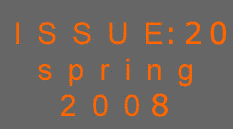
An Interesting Idea

by Andrew Teller
A couple of years ago, the French Commissariat à l’Energie
Atomique (Atomic Energy Commission, CEA for short)
entrusted sociologists with the task of investigating the reasons
why so
many people were afraid of nuclear energy. In an article recently
found on the Internet1, an observer named Jean-Pierre
Dupuy was reported to have commented that it seemed to him far
more urgent
to commission an anthropological investigation aiming at understanding
why the “nucleocrats” were not afraid of it.
That Jean-Pierre Dupuy is no friend of the nuclear
industry is clear to all those who have heard of his work. In
a book such as Retour de Tchernobyl,
le journal d’un homme
en colère2 (Back from Chernobyl, the Diary of an Outraged
Man), he equates the civil use of nuclear energy with sheer madness,
almost on a par with its military developments. At the same time,
he is no run-of-the-mill anti-nuclear; Jean-Pierre Dupuy followed
the brightest academic curriculum that can be imagined in France.
He graduated from the famous Ecole Polytechnique and then from
the no less famous Ecole des Mines, which means that he belongs
to an elite within an elite. He teaches social and political
philosophy both at the Ecole Polytechnique and at Stanford University.
This is one reason why I feel that his recommendation cannot
be brushed aside without further thought. Another, more important,
reason is that his proposal makes a lot of sense from a methodological
point of view. Our understanding of a matter as baffling as this
one will only benefit from being tackled from different angles.
With a bit of luck, the light shed by one approach could make
up for the areas left in the dark by the other. Since the mindset
of the supporters of nuclear energy is not unknown to me, I cannot
resist the temptation of trying to offer my own answer to this
question, pending a fully-fledged enquiry conducted by professionals.
Why on earth aren’t we afraid of nuclear energy? Here is
a non exhaustive list of reasons that spring to my mind.
-
Because of the overall good record
in terms of safety of the nuclear industry compared to the
other energy generation
activities. This is not the place to start an argument about
what the actual figures are or should be; suffice it to say
here that there are numerous surveys indicating that the
number of casualties per terawatt-hour due to nuclear power
plants
is lower than for other energy sources, notably hydro-power.
Critics of nuclear energy will of course object that the
statistics we rely on are biased. We in turn can assert that
their figures
are inflated for reasons diametrically opposite to ours.
-
Because we consider that focussing on the magnitude
of the potential damages of an activity without taking account
of the probability attached is not rational. It must be pointed
out in this respect that J.-P. Dupuy’s book titled Pour
un catastrophisme éclairé3 (For an enlightened “catastrophism”)
devotes a sizeable amount of space trying to get rid of the
probability factor.
-
Because all those who are trying to scare us away
from the civil use of nuclear energy make mistakes in their
appraisal of the facts. How could we be swayed by the views
of people who obviously misunderstand essential features
of the matter under consideration? It must be noted here
that
Prof. Dupuy is not immune to this shortcoming since he himself
seems to believe that the Chernobyl accident could have evolved
in a true atom-bomb-type explosion. We all know that the
low enrichment of the fuel and its physical layout precluded
an
atomic explosion. Unit 2 of Chernobyl actually underwent
a chemical explosion the outcome of which was about the worst
that could be expected from this type of accident.
-
Because we believe that the Chernobyl accident resulted
from a gross violation of procedures that could only happen
in a very specific environment that was at the time characterised
by insufficient professional training and perverse productivity
incentives.
-
Because we believe that getting obsessed with the
dangers of nuclear energy can lead us to overlook other,
more likely, threats. It all boils down to optimising the
allocation
of limited resources to monitor the numerous problems of
the modern world.
-
Because we are all aware of the enormous
efforts spent keeping the safety of nuclear activities at
the highest
level. It can even be claimed that the nuclear industry as
a whole has invented a quality assurance system aiming to
fighting the main threat to high performance: complacency.
The past
record of this industry indicates that complex systems such
as nuclear power generation can be successfully handled.
-
Because we believe that deep geological disposal
provides a suitable solution to the question of the radioactive
.waste.
-
Because the more sophisticated of
our critics never deem it necessary to express their disapproval
of unfair
attacks of their not-so-sophisticated brothers. They so lose
a golden
opportunity of putting themselves in the position of a fair
arbiter who can be listened to by all parties.
The last item of this list leads me to the conclusion of this
column in the shape of two observations. First J.-P. Dupuy’s
proposal might be less disingenuous than it seems. Resorting
to an external authority – in the present case, sociologists
or anthropologists – to elucidate a matter of opinion might
imply that there is something wrong with the population to be
investigated. This comment can of course apply to the CEA’s
initiative. In the same vein, Prof. Dupuy’s recommendation
might be a subtle way of implying that those holding misguided
opinions are not those who one might think. Second, the external
authority resorted to must be unbiased to deserve its status
of independence. This cannot be guaranteed in the present context:
the investigators will be as much affected by the matter under
consideration as the people investigated. In order to minimise
the impact of unavoidable biases, I suggest the following. Let
samples of both groups (those afraid and those who are not) be
investigated each by sociologists of opposite opinions and let
the latter cross-examine the results of their respective enquiries.
Since one’s critical power is always at its best when exercised
on opinions one disagrees with, this is how we stand the best
chance of coming to a genuinely useful implementation of this
interesting idea.
1 www.marianne2.fr/Bandajevsky-le-medecin-dissident_a66921.htm
2 Le Seuil, Paris, 2006
3 Le Seuil, Paris, 2002 |





